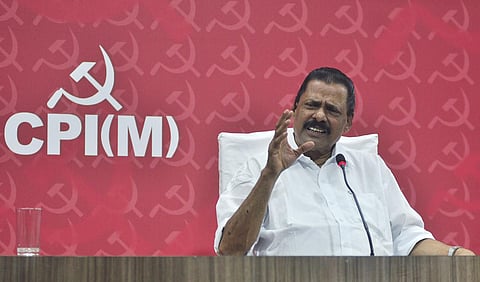The political storm in Kerala has escalated after the alleged leak of a confidential CPI(M) letter, sparking fierce accusations and counter-allegations between the Left, Congress, and BJP. The Congress and BJP camps have alleged that the letter exposed deep divisions within the CPI(M) and indicated a leadership crisis. However, the CPI(M) has strongly denied these charges, labeling the controversy as a deliberate attempt to slander its top leadership. The party has claimed that the so-called revelations are fabrications aimed at undermining its credibility ahead of crucial electoral battles in the state.
CPI(M) leaders have accused the opposition of orchestrating a calculated “slander campaign” designed to weaken public faith in the Left government’s leadership. They argue that the timing of the leak is highly suspicious, coinciding with major policy debates and welfare initiatives that the party claims are popular among citizens. According to insiders, the party is preparing to counter these allegations by launching a robust campaign that will highlight its governance record while simultaneously exposing what it calls the “hypocrisy and opportunism” of its rivals. The Left’s leaders maintain that the people of Kerala can see through such smear tactics and will not be swayed by baseless propaganda.
The controversy has also sparked heated debates in Kerala’s Assembly and political circles, with rival camps trading barbs over the authenticity of the letter and its contents. While the Congress and BJP have tried to use the issue to project CPI(M) as a fractured party, the Left argues that such claims are intended to create confusion among voters. CPI(M)’s response has been to turn the issue into a political rallying point, presenting itself as a victim of orchestrated conspiracies while portraying its opponents as desperate to grab power.
The letter leak controversy has also reignited long-standing debates about transparency within political parties in Kerala. Critics argue that such episodes expose how internal communications can be weaponized to create distrust among voters. Opposition leaders are using this to question CPI(M)’s internal discipline and accountability mechanisms. On the other hand, CPI(M) supporters argue that every party has internal documents and communications, and misusing them for political gain undermines democratic ethics. This clash over transparency versus confidentiality has added yet another dimension to Kerala’s already complex political landscape, deepening ideological divides across the state.
The Congress and BJP have seized the opportunity to frame CPI(M) as a party that thrives on secrecy and authoritarian leadership. Both parties have amplified the letter issue on public platforms, calling it proof of inner cracks in the Left’s leadership. They claim that voters deserve to know what is happening behind closed doors, particularly when it involves those in power. CPI(M) counters this by saying that the opposition is blowing things out of proportion to distract from their lack of credible policies and their failures in governance. This tug-of-war over narrative-building has made the row a centerpiece of political conversations in Kerala.
At the grassroots level, CPI(M) cadres are reportedly experiencing pressure to defend their leadership while also countering the opposition’s attacks. Many have taken to local meetings, social media platforms, and neighborhood campaigns to reaffirm their loyalty to the party and refute claims of division. This proactive response suggests that CPI(M) is leaving nothing to chance, recognizing the power of perception in electoral politics. Party insiders note that the controversy may even help strengthen cadre unity by rallying them against what they view as a common external attack.
Meanwhile, civil society and political commentators are deeply divided on the issue. Some analysts believe that the leak genuinely reveals fault lines within CPI(M), reflecting broader generational and ideological differences. Others, however, see it as a manufactured controversy, amplified by the opposition for political mileage. The uncertainty surrounding the authenticity of the letter itself complicates matters further, with no conclusive evidence either confirming or debunking its legitimacy. This ambiguity is fueling speculation, leaving the public caught between competing narratives and media spin.
Kerala’s media has played a major role in amplifying the controversy, with television debates and opinion pieces dominating public discourse. Newsrooms are buzzing with analysis of every line in the alleged letter, often framing it as a window into the CPI(M)’s inner workings. However, some observers argue that this focus on sensationalism may divert attention from pressing issues such as unemployment, healthcare, and inflation. By centering the conversation on a leaked document, the media may inadvertently be strengthening the opposition’s narrative while weakening the public’s trust in the government’s priorities.

For the CPI(M), the biggest challenge is ensuring that the controversy does not affect its voter base in rural Kerala, where support has historically been strong. The party has already launched targeted outreach in villages, highlighting welfare programs such as housing schemes, pensions, and subsidies that directly impact citizens’ lives. By reminding voters of tangible benefits, CPI(M) hopes to neutralize the impact of the letter controversy. Leaders argue that ordinary citizens are more concerned with livelihood issues than political drama, which they believe will ultimately play in the party’s favor.
CPI(M) Plans Aggressive Counter-Campaign
In response to the uproar, CPI(M) is reportedly preparing to launch a full-fledged counter-offensive, both in the media and on the ground. Party strategists have emphasized that their messaging will focus on unity, resilience, and transparency. By doing so, they aim to defuse doubts about internal divisions and reassure the public about the leadership’s stability. CPI(M) leaders plan to showcase development achievements under their governance, including welfare measures in education, healthcare, and rural upliftment, to shift the narrative away from the letter leak and onto their governance credentials.
At the same time, the Left is preparing to highlight alleged scandals and failures of the Congress and BJP, thereby putting its rivals on the defensive. Party cadres across Kerala have been instructed to mobilize supporters and intensify grassroots outreach, ensuring that the opposition’s allegations are contested at every level. By countering propaganda with facts and direct communication, CPI(M) hopes to rally its voter base and prevent erosion of trust. Leaders insist that the so-called leak will only serve to strengthen the party by uniting cadres against external attacks.
Broader Political Implications
The row over the leaked letter has underscored how Kerala’s political battleground is increasingly defined by perception wars as much as by policy debates. For the Congress and BJP, the controversy provides ammunition to attack CPI(M) as a party struggling with internal rifts. For the Left, however, it is a chance to turn adversity into opportunity by portraying itself as a victim of political vendettas. Whether this controversy fades or snowballs into a defining issue for upcoming elections will depend largely on how effectively CPI(M) can control the narrative. Ultimately, the battle over this letter represents a deeper struggle for public trust in Kerala’s vibrant democracy.

Opposition parties, however, are not letting the issue fade easily. The Congress has vowed to keep the pressure alive by raising the matter in every available platform, including the state Assembly. The BJP, on the other hand, is using the controversy to expand its foothold in Kerala, portraying CPI(M) as corrupt and undemocratic. For both parties, the row offers a rare chance to put the Left on the defensive, something that has historically been difficult given CPI(M)’s organizational strength in the state. This makes the controversy not just a passing scandal but a potential game-changer.
The timing of the controversy is also significant, as Kerala is preparing for upcoming electoral contests where every issue could swing voter sentiment. Political observers note that perception battles become especially crucial in the months leading up to elections, with parties keen on framing narratives that resonate with undecided voters. CPI(M) recognizes this and is treating the letter leak not as a minor irritant but as a serious threat that must be managed with urgency and precision. Its campaign strategies are being recalibrated to ensure minimal damage to its credibility.
Beyond Kerala, the controversy has caught the attention of national political observers who see it as a reflection of how vulnerable even dominant parties can be to perception-driven attacks. Some suggest that this incident underscores the growing role of information leaks and digital exposure in Indian politics. Whether genuine or fabricated, such leaks can sway voter sentiment, shift media narratives, and disrupt governance agendas. In this way, the Kerala letter leak is being studied as a case study in political communication and crisis management at both state and national levels.

Ultimately, the letter leak saga reflects a broader struggle for political dominance in Kerala, where competition between the CPI(M), Congress, and BJP is increasingly fierce. For CPI(M), the road ahead depends on whether it can successfully convince the public that this is a manufactured controversy. For the opposition, the goal is to keep the issue alive long enough to erode trust in the Left’s leadership. How the narrative unfolds in the coming weeks will not only shape Kerala’s political trajectory but also reveal how modern politics thrives on perception as much as policy.
Follow: Kerala Government
Also read: Home | Channel 6 Network – Latest News, Breaking Updates: Politics, Business, Tech & More

